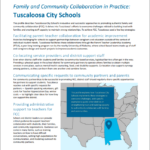Tuscaloosa City Schools District Profile
Tuscaloosa City Schools (Tuscaloosa) is in western  Alabama, approximately 60 miles from Birmingham. One of the key goals in the district’s 2021-24 strategic plan is improving stakeholder engagement. Thanks to new initiatives and a strong network of local partners, Tuscaloosa has increasingly fostered opportunities for collaborative decision-making by teachers, families, and community organizations.
Alabama, approximately 60 miles from Birmingham. One of the key goals in the district’s 2021-24 strategic plan is improving stakeholder engagement. Thanks to new initiatives and a strong network of local partners, Tuscaloosa has increasingly fostered opportunities for collaborative decision-making by teachers, families, and community organizations.
Video Spotlight
Featured Strategies
- Facilitating parent-teacher collaboration for academic improvement
It can be challenging for schools to support partnerships between caregivers and educators outside of the context of individual student needs. Tuscaloosa facilitates these collaborations through the Parent Teacher Leadership Academy (PTLA), a year-long training program run by the nearby University of Alabama, where school-based teams made up of staff and caregivers design and launch projects to improve academic outcomes. - Co-locating service providers and district support staff
Even when district staff refer students and families to community-based services, logistical barriers often get in the way. Providing a physical space in the school district for community partners to operate allows families to obtain multiple services in one place, such as mental health counseling, food, and disability supports. Co-location also supports synergy among partners, as they can learn from one another and combine forces. - Communicating specific requests to community partners and parents
For community partnerships to be successful in promoting FCC, district staff should regularly share specific opportunities for partners to support students. Tuscaloosa reaches out with specific requests for partners — Spanish-speaking volunteers, gift cards for Teacher Appreciation Day, winter coats — to highlight clear ideas for how they can support the district. - Providing administrative support to teachers for FCC
School and district leaders can provide critical guidance to support teachers’ collaboration with students, their families, and community organizations. Guidance can come in many forms, such as training teachers on how to have difficult conversations, setting high expectations for communication, and modeling outreach to community partners.
Continue learning
Browse resources on this topic in the resource library.
